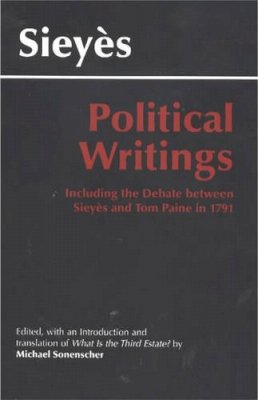
Political Writings
Emmanuel Sieyes
The abbe Emmanuel Joseph Sieyes (1748-1836) distinguished himself as the chief theoretician of the French Revolution--and as a revolutionary constitutional and social theorist in his own right--through his rigorously analytical theory of representative government and its corollary, the representative character of social life in general. He expressed the essence of his thought in a series of three pamphlets published in the months leading up to the meeting of the Estates-General in 1789. This volume presents all three essays--Views of the Executive Means, An Essay on Privileges, and What Is the Third Estate?--in their entirety. The third essay, in a new translation by Michael Sonenscher, is followed by Sieyes's 1791 newspaper debate with Tom Paine on the merits of monarchy versus republicanism. Elucidated by Sonenscher's insightful Introduction, these texts will fascinate anyone interested in the history of the French Revolution, the history of social and political thought, or the origins and character of modern liberalism.
Product Details
About Emmanuel Sieyes
Reviews for Political Writings
Murray Forsyth, History of Political Thought This is an invaluable contribution to the study of political thought. Sieyès was the most important political thinker of the French Revolution and one of the great theorists of representative government. Michael Sonenscher has made it easier for Anglophone readers to understand why. In addition to excellent translations, he provides a brilliantly original and illuminating Introduction to these fundamental texts.
Keith Michael Baker, Stanford University Michael Sonenscher's edition of Emmanuel Joseph Sieyes's political writings is, in effect, two substantial works in one. First, Sonenscher provides readers with a sorely needed English-language edition of Sieyes's work that goes beyond the frequently anthologized, but almost inevitably excerpted, 'What is the Third Estate?' With the addition of two contemporaneous pamphlets ('Views of the Executive Means Available to the Representatives of France in 1789' and 'An Essay on Privileges') as well as Sieyes's 1791 debate with Tom Paine, Sonenscher has crafted a scholarly resource that will remain a point of reference for some time. Second, by way of an introduction to this well-translated and annotated edition, Sonenscher offers a lengthy, ambitious essay that, drawing on manuscript sources, gives a fresh and equally overdue perspective on Sieyes's political thought. . . . With this edition of Sieyès's works, Hackett has proven once again that it is much more than a niche publisher of staid and inexpensive classroom editions of the classics in politics and philosophy. As readers of Hackett's editions of Bernard Mandeville (ed. E. J. Hundert), Edmund Burke (ed. J. G. A. Pocock), Niccolo Machiavelli (ed. David Wootton) and Charles-Louis Montesquieu (ed. Melvin Richter)
to name just a few
already know, Hackett is no country cousin to the higher profile series, Cambridge Texts in the History of Political Thought, but is also reshaping and reinvigorating the discipline of the history of political thought. Sonenscher's edition of Sieyès's political writings is no exception.
Paul Cheney, University of Chicago, for H-France Review
